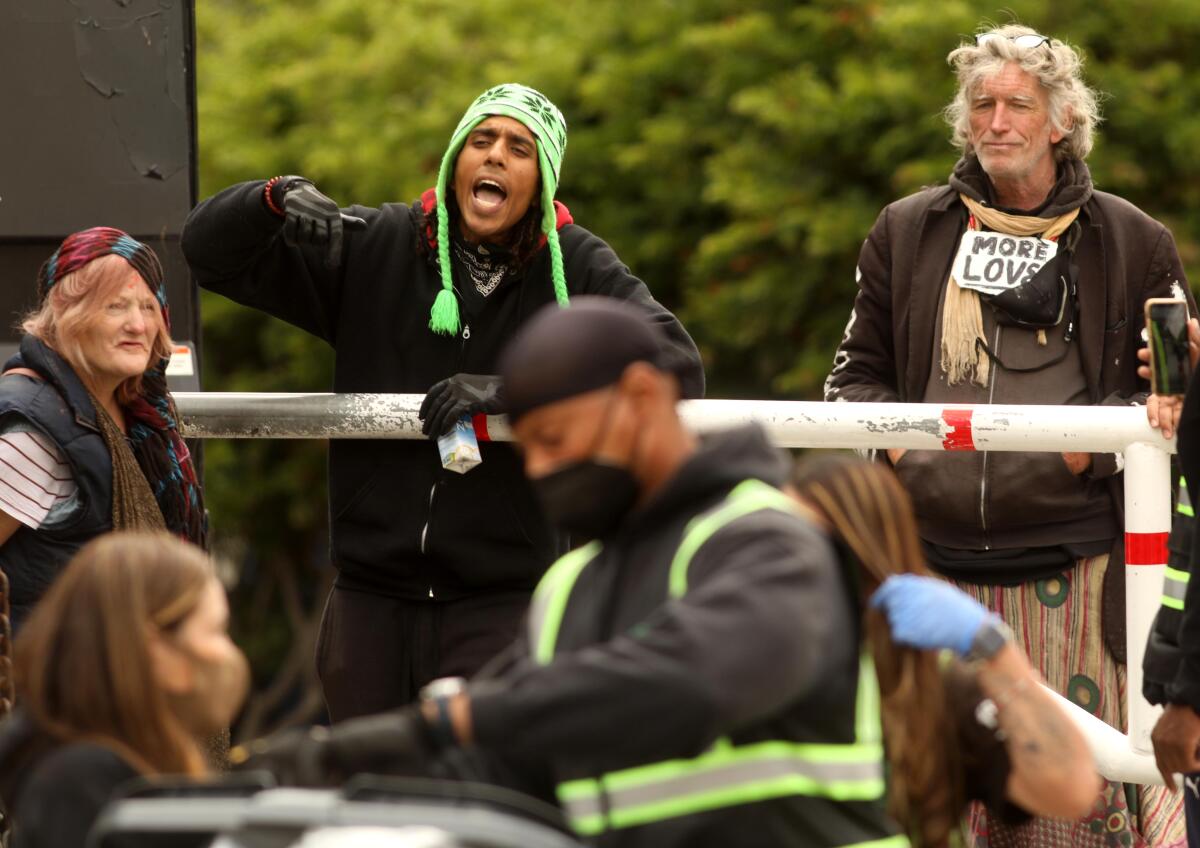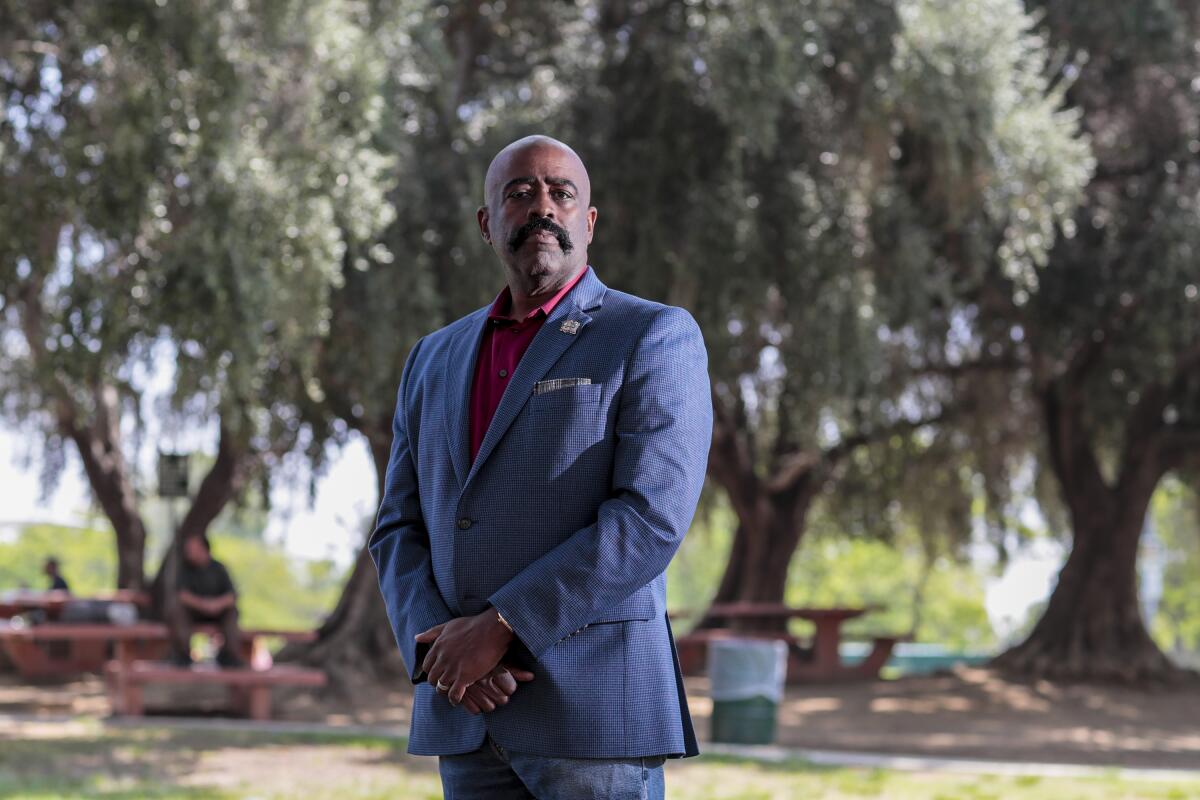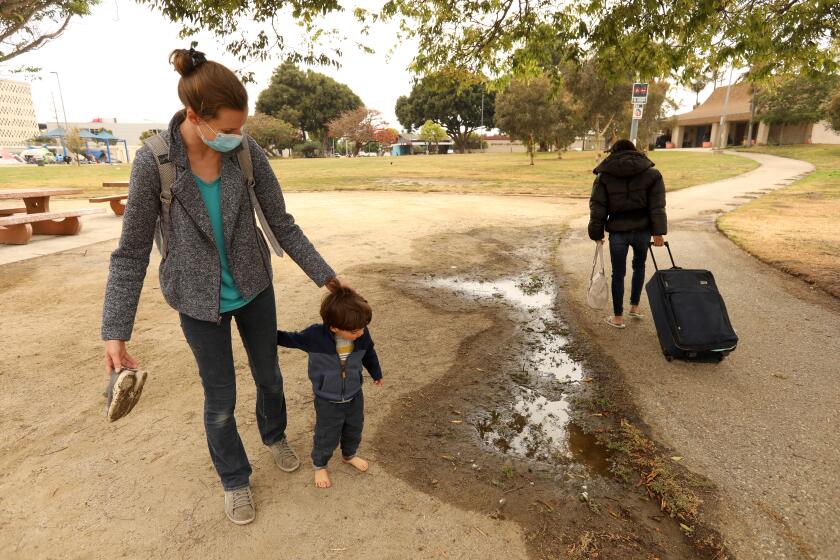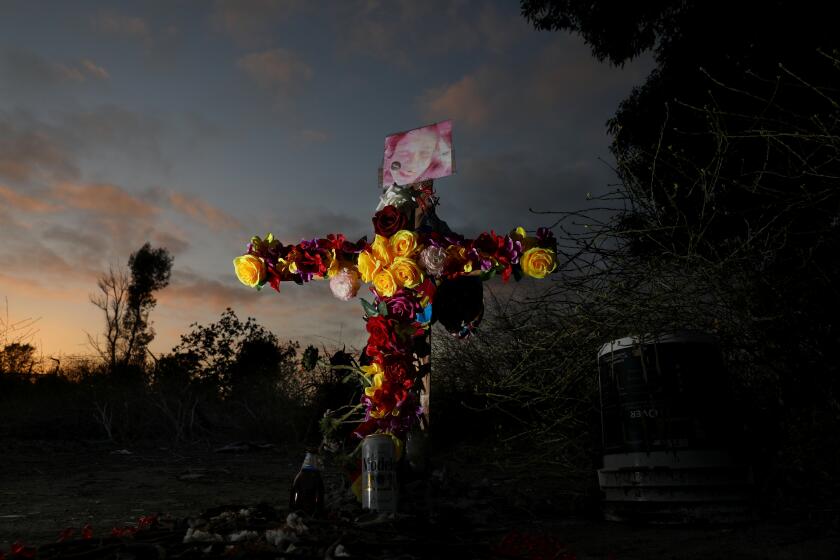Evicted from Echo Park, he wanted to bring a homeless camp to Griffith Park. Things got messy

- Share via
Six weeks ago, Los Angeles city park rangers descended on a small group of tents in Griffith Park, arresting a homeless man and at least two community activists who had gone there to show their support.
Park rangers said they took that step because camping poses a major fire risk in Griffith Park, and because the group refused to take down their tents, which are prohibited by law in city parks. The group was taken into custody even though an aide to Councilwoman Nithya Raman showed up and asked the rangers not to make arrests.
The Griffith Park incident drew scant attention at the time, particularly when compared with the uproar that greeted the city’s decision to clear a massive encampment at Echo Park Lake in March. But it has emerged as yet another source of conflict over the city’s handling of its recreation areas during a huge homelessness crisis.
Since the confrontation, homeowners in Los Feliz have contacted Raman’s office to express their fears about the fire danger posed by encampments in Griffith Park, which had a massive blaze in 2007 that triggered evacuations and burned hundreds of acres.
Activists have taken aim at the park rangers, accusing them of failing to follow the proper protocols for dealing with homeless people. The head of the union that represents park rangers criticized Raman, saying her aide interfered with their work in Griffith Park that night — a claim one Raman aide called “hyperbolic.”
Raman told The Times that she supported the city’s law against camping in parks but also viewed incarceration as unproductive, saying it makes it more difficult to build trust with homeless people and, ultimately, to get them into homes.
“Arrests should also be used only as a last resort to preserve community safety after a services-led approach has been exhausted,” she said in an email.
Ayman Ahmed, one of the people arrested that night, said he, another homeless man and some activists had gone to the park in the belief that Raman, who had previously spoken out about the closure of Echo Park, would let them stay.
Ahmed was one of the last two holdouts at Echo Park and had been looking to create “something nice, something clean, something sustainable.”
“Thank God I didn’t bring anyone else from the park there who was actually homeless. It would have just been more trauma for them,” said the 27-year-old, who is now living in a van.
L.A.’s search for new solutions to a growing homelessness crisis is running up against residents’ love of their beaches and park spaces.
With park space becoming increasingly contested terrain, tensions are likely to increase.
City crews recently reopened Echo Park Lake to the public after the cleanup of an encampment that had nearly 200 tents and produced 35 tons of trash. Homeless advocates have denounced Councilman Mitch O’Farrell for seeking the cleanup and city leaders for assigning police to patrol the area.
On the Westside, Councilman Mike Bonin sparked an outcry after he identified several park and recreation areas in his district as potential sites for temporary homeless facilities. At the same time, some of his constituents have demanded that grassy areas along the Venice Boardwalk receive an encampment cleanup similar to the one in Echo Park.
In downtown Los Angeles, the grassy section of Grand Park has been closed for eight months, ever since sheriff’s deputies dismantled an encampment set up there to promote Black unity. The closure has disappointed park advocates, who say downtown already lacks open space.

Meanwhile, some in the San Fernando Valley are upset that Councilman Paul Krekorian converted a portion of Alexandria Park into a tiny-home village for about 200 homeless people. Walter Hall, who sits on the Greater Valley Glen Neighborhood Council, said residents were told the village would remain for at least three years.
“We have less trees, less grass, less places for people to get out of their apartments and enjoy the outdoors,” he said.
Homelessness activists don’t sound much happier, saying the installation of the tiny homes provided the city an excuse to clear homeless people out of public spaces in North Hollywood. When the tiny-home village opened, those activists disrupted the ribbon cutting.
The debates over parkland do not surprise Carolyn Ramsay, executive director of the Los Angeles Parks Foundation, which raises money for new park facilities. During the pandemic, residents who felt stuck in their homes found relief in L.A.’s recreation areas, she said.
“Being in a park has been one of the best parts of COVID for them, so they feel protective of their park spaces,” Ramsay said.
In Raman’s district, the showdown in Griffith Park last month has continued to reverberate. On April 12, park rangers approached half a dozen tents that had been set up near the old zoo by a small group of activists and homeless people, according to one report prepared on the incident, a copy of which was reviewed by The Times.
The rangers informed the group that the tents were in a “very high fire severity zone” and gave instructions to dismantle them, the report said.
Caleb Crowder, an activist arrested that night, said he and others told the rangers that the federal Centers for Disease Control and Prevention had advised government agencies to leave encampments in place during the COVID-19 pandemic if housing options were not available.
“We were telling them time and time again, you are not supposed to be displacing people,” said Crowder, who said he was in the park to show solidarity with the homeless people there.

Crowder is a volunteer with Ground Game Los Angeles, a progressive advocacy group that has been a sharp critic of the city’s handling of homelessness and a major supporter of Raman. In recent weeks, the head of that group has criticized the park rangers, saying they should have immediately contacted Raman’s office and homeless outreach workers after finding the tents, so that shelter could be offered.
Homeless people should not be arrested for simply setting up tents in parks, said Bill Przylucki, Ground Game’s executive director. And even if an outreach worker has offered a shelter bed or a hotel room, they should have the right to say no and stay where they are, he said.
“If the offer isn’t housing — not shelter, not a voucher, but housing — then unequivocally yes, they should be allowed to stay in the park,” said Przylucki, who said his group supported the action in Griffith Park but did not organize it.
The Los Feliz Improvement Assn., a neighborhood group in the area, offered a different response, telling Raman in a letter last month that encampments pose a major fire threat to the park. Chris Laib, the group’s former president, said cigarettes, matches and barbecue equipment could easily spark a blaze in the dry brush.
“I don’t think the rangers had any choice,” he said. “God forbid if there had been a fire there. The council office would have been culpable.”
Ahmed, the 27-year-old now living in a van, said he had been told that staying in the park was “a sure thing.” He also said there were two homeless people at the camping spot that night — and that he was the only homeless person arrested.But had Raman’s office allowed the tents to remain, “everyone else was going to come,” he said.
“We had the understanding that she would be more supportive of unhoused folks, and that we could grow our community there,” Ahmed said. “But I guess the park rangers had a different plan.”
Ahmed, Crowder and a third person were arrested on suspicion of erecting tents in the park, which can result in a maximum $1,000 fine or six months in jail. A spokesman for City Atty. Mike Feuer said this month that prosecutors had not decided whether to file charges. The head of the city’s park rangers declined an interview request.
Jesse Zwick, a spokesman for Raman, said no one in the council office suggested that it would be OK for homeless people to sleep in Griffith Park. He did confirm that one of Raman’s staffers, field manager Tabatha Yelós, asked rangers not to make arrests that night — a request that was ignored.

The head of the park rangers union had sharp words on that front, accusing Raman’s aide of interfering with the rangers’ work. Marshall McClain, president of the Los Angeles Airport Peace Officers Assn., said he also believed Raman’s staffers blurred the lines between their government duties and the activism of Ground Game, which supports the abolition of the Los Angeles Police Department.
Three people were killed along Compton Creek in the last year. Their killer, authorities say, was a man who lived in a homeless encampment along the creek.
State business filings show that Yelós served last year as chief executive of Ground Game. Yelós also co-hosted an episode of the Ground Game video production Knock@Nite in December, discussing police brutality, the defund movement and the international use of the acronym ACAB — “All Cops Are Bastards.”
“The police suck here and they suck in Latin America,” said Yelós, who was not employed by the city at that time.
McClain questioned whether such remarks would make it more difficult for park rangers to work with Raman’s office. “If you’re employing people with that type of mentality, where does that leave us?” he asked.
Yelós stepped down from the Ground Game post in January, before becoming a council aide, according to Raman’s spokesman. Asked about McClain’s remarks, Raman said her office had had a productive relationship with the park rangers.
Still, the councilwoman said that Yelós’ actions in Griffith Park were “not representative” of the office’s broader approach to homelessness. And she stated that she did not share the opinion expressed by Yelós on video last year.
“Those are not my views, nor are they the views of this office,” Raman said.
Raman’s office also provided a separate statement from Yelós on the video, which said: “My intention was simply to highlight the fact that the issue of police brutality is not isolated to the United States, but one that generates strong feelings worldwide.”
More to Read
Sign up for Essential California
The most important California stories and recommendations in your inbox every morning.
You may occasionally receive promotional content from the Los Angeles Times.













